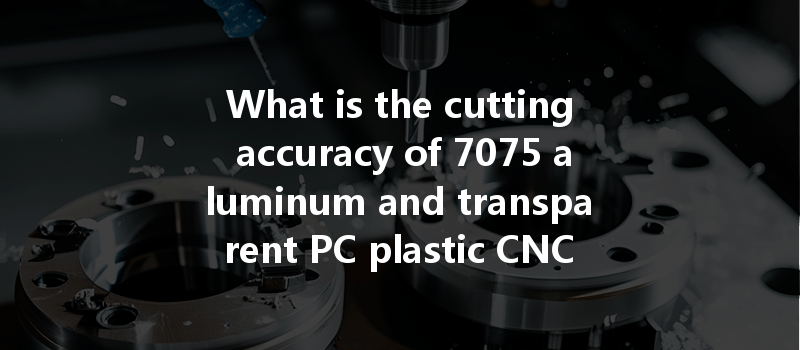Did you know that CNC machining has revolutionized the manufacturing industry, allowing for precision cuts to within a few microns? This astonishing advancement doesn’t just enable speed and efficiency; it also assures manufacturers that they can create parts with high levels of accuracy, even with materials as diverse as 7075 aluminum and transparent polycarbonate (PC) plastic.
In this blog, we will delve deeply into the cutting accuracy of 7075 aluminum and transparent PC plastic CNC machining. To ensure seamless pathways through potentially complex material properties, we’ll discuss the relevance of CNC technology, the specifics of machining processes for these materials, and provide practical solutions for achieving optimal cutting accuracy.
—
Understanding CNC Machining
CNC (Computer Numerical Control) machining is a process that uses computerized controls to manipulate machine tools for cutting, milling, drilling, and shaping materials. These machines follow precise coordinates (or numerical data) to produce parts that meet exact specifications, making CNC machining essential in aerospace, automotive, electronics, and other industries.
Quality Assurance in CNC Machining
CNC machining plays a crucial role in ensuring quality assurance. Using digitally controlled machinery allows for consistency across production runs, dramatically reducing the likelihood of human error often associated with manual manufacturing.
The Attributes of 7075 Aluminum and PC Plastic
7075 Aluminum
7075 aluminum is known for its high strength-to-weight ratio, making it one of the most sought-after materials in industries like aerospace and military applications. Its properties include:
Transparent PC Plastic
Polycarbonate (PC) plastic features excellent optical clarity and is known for its toughness, making it ideal for applications requiring transparency along with high impact resistance. Some of its characteristics are:
The Importance of Cutting Accuracy
Cutting accuracy is crucial when it comes to CNC machining, especially for complex parts that need to fit together within tight tolerances. Poor accuracy can lead to:
Achieving Cutting Accuracy with 7075 Aluminum and PC Plastic
The first step toward achieving the desired cutting accuracy is selecting the correct material. Both 7075 aluminum and PC plastic have unique machining properties, so consideration should be given to tools, feed rates, and cutting speeds that best complement these materials.
Using the right tools is paramount to achieving accuracy. For 7075 aluminum:

For PC plastic:
Optimizing machining parameters such as RPM, feed rate, and depth of cut can significantly affect the finished product’s accuracy.
Applying the right coolant effectively can improve cutting accuracy by:
The accuracy of CNC machining strongly depends on the machine’s condition. Regular maintenance, calibrated settings, and checks ensure that the CNC machines deliver precise outcomes every time.
Before actual machining, using computer simulations can help predict problems and allow for adjustments in the CAM (Computer-Aided Manufacturing) programs. Testing prototypes first can save time and materials.
After machining, it is essential to have a robust quality control process, including inspections for dimensional accuracy and surface finish. Implementing techniques such as Coordinate Measuring Machines (CMM) or laser scanning can effectively achieve this goal.
Addressing Common Challenges in Machining 7075 Aluminum and PC Plastic
Throughout this comprehensive guide, we have explored the vital factors influencing the cutting accuracy of 7075 aluminum and transparent PC plastic in CNC machining.
By selecting suitable materials, tools, and optimized machining parameters, manufacturers can significantly enhance precision and ensure high-quality outcomes. Maintaining rigorous quality checks also ensures that the manufactured parts meet specifications, thus sustaining their production processes.
It’s essential to recognize that understanding cutting accuracy not only aids in producing superior parts but also in fostering better relationships with clients and capitalizing on innovation within the industry.
Ultimately, mastering the intricacies of cutting accuracy in CNC machining should be on every manufacturer’s agenda. As technology and customer demands continue to evolve, so too must our operational methodologies, making this knowledge not just important—it’s indispensable.






